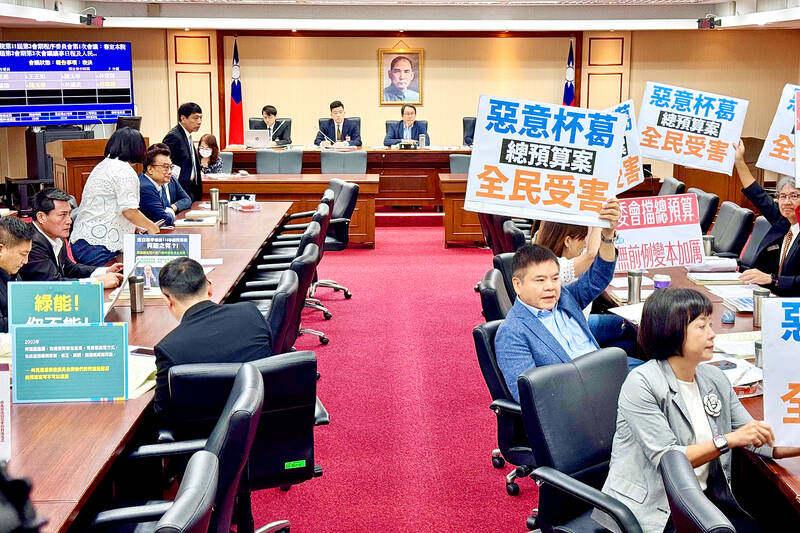The legislature’s Procedure Committee yesterday voted against scheduling a debate on next year’s budget as opposition legislators said the proposed budget was missing funding items that were omitted by the Cabinet.
The Chinese Nationalist Party (KMT) and Taiwan People’s Party (TPP) on Friday last week used their combined legislative majority to vote to return next year’s proposed budget to the Procedure Committee, which organizes bills and determines which are to be discussed and when.
The committee voted nine to seven with one abstention to not schedule a hearing for the budget, which led to the committee’s Democratic Progressive Party (DPP) members raising protest signs.

Photo: Chen Cheng-yu, Taipei Times
All but one of KMT and TPP committee members voted against scheduling a hearing with the sole abstention being KMT Legislator Lo Ting-wei (羅廷瑋).
When the meeting started, KMT caucus whip Lin Tzu-ming (林思銘) moved to postpone all 12 proposals. While this is allowed, it is unprecedented, said DPP Legislator Shen Fa-hui (沈發惠), who chairs the committee.
The decision to postpone the budget review could result in other committees not having their own budget proposals to review, he added.
KMT Legislator Chen Yu-jen (陳玉珍) pushed back on Shen’s statement, saying that the budget needs to be redrafted to include important amendments passed earlier this year, like increased logging compensation for indigenous people, higher prices for national food stocks and National Health Insurance point adjustments.
The KMT is asking the administration to incorporate these resolutions into the budget and ensure the government is spending taxpayers’ money appropriately, he added.
He accused the DPP of having postponed prior budgets, such as in 2008, which resulted in several DPP officials clarifying that past budgets were never postponed, only critiqued.
DPP Legislator Michelle Lin (林楚茵) accused the opposition legislators of putting on a show, harming the nation and not actually reading the proposed budget.
The proposed budget included a 3 percent salary raise for public servants and school subsidies, she said.
If the opposition parties have issues with individual ministry budgets, those could be raised in committee reviews, rather than postponing the whole budget, DPP Legislator Chuang Ruei-hsiung (莊瑞雄) said.
Premier Cho Jung-tai (卓榮泰) expressed dismay at the committee’s decision, saying that the budget could be explained, discussions could be held and dissenting views would be respected.
DPP caucus chief executive Rosalia Wu (吳思瑤) called the decision irrational and claimed that it “erodes” Taiwan’s democracy. She also warned the opposition that public opinion would turn against them.
Additional reporting by Hsieh Chun-lin and Chen Cheng-yu

CHAOS: Iranians took to the streets playing celebratory music after reports of Khamenei’s death on Saturday, while mourners also gathered in Tehran yesterday Iranian Supreme Leader Ayatollah Ali Khamenei was killed in a major attack on Iran launched by Israel and the US, throwing the future of the Islamic republic into doubt and raising the risk of regional instability. Iranian state television and the state-run IRNA news agency announced the 86-year-old’s death early yesterday. US President Donald Trump said it gave Iranians their “greatest chance” to “take back” their country. The announcements came after a joint US and Israeli aerial bombardment that targeted Iranian military and governmental sites. Trump said the “heavy and pinpoint bombing” would continue through the week or as long

TRUST: The KMT said it respected the US’ timing and considerations, and hoped it would continue to honor its commitments to helping Taiwan bolster its defenses and deterrence US President Donald Trump is delaying a multibillion-dollar arms sale to Taiwan to ensure his visit to Beijing is successful, a New York Times report said. The weapons sales package has stalled in the US Department of State, the report said, citing US officials it did not identify. The White House has told agencies not to push forward ahead of Trump’s meeting with Chinese President Xi Jinping (習近平), it said. The two last month held a phone call to discuss trade and geopolitical flashpoints ahead of the summit. Xi raised the Taiwan issue and urged the US to handle arms sales to

BIG SPENDERS: Foreign investors bought the most Taiwan equities since 2005, signaling confidence that an AI boom would continue to benefit chipmakers Taiwan Semiconductor Manufacturing Co’s (TSMC, 台積電) market capitalization swelled to US$2 trillion for the first time following a 4.25 percent rally in its American depositary receipts (ADR) overnight, putting the world’s biggest contract chipmaker sixth on the list of the world’s biggest companies by market capitalization, just behind Amazon.com Inc. The site CompaniesMarketcap.com ranked TSMC ahead of Saudi Aramco and Meta Platforms Inc. The Taiwanese company’s ADRs on Tuesday surged to US$385.75 on the New York Stock Exchange, as strong demand for artificial intelligence (AI) applications led to chip supply constraints and boost revenue growth to record-breaking levels. Each TSMC ADR represents

Pro-democracy media tycoon Jimmy Lai’s (黎智英) fraud conviction and prison sentence were yesterday overturned by a Hong Kong court, in a surprise legal decision that comes soon after Lai was jailed for 20 years on a separate national security charge. Judges Jeremy Poon (潘兆初), Anthea Pang (彭寶琴) and Derek Pang (彭偉昌) said in the judgement that they allowed the appeal from Lai, and another defendant in the case, to proceed, as a lower court judge had “erred.” “The Court of Appeal gave them leave to appeal against their conviction, allowed their appeals, quashed the convictions and set aside the sentences,” the judges